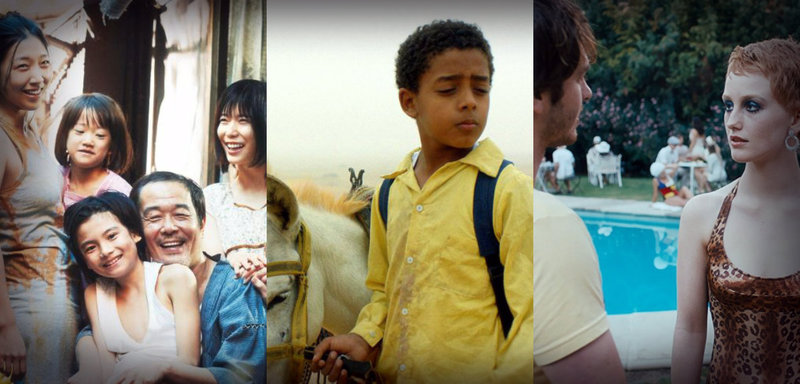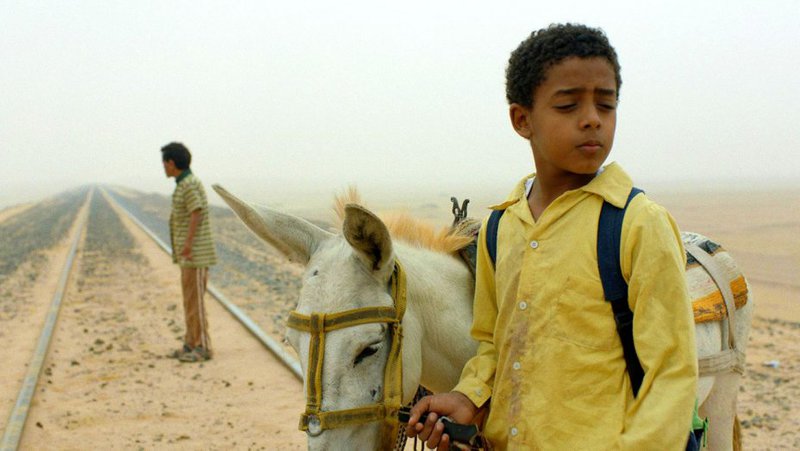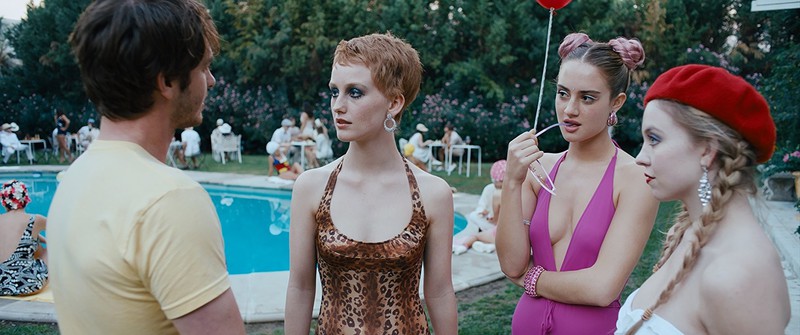
TLDR: My last day of Cannes writeups! Shoplifters is a heart-wrenching, nuanced, complicated work of art, easily worthy of the Palme d’Or; Yomeddine is a good-natured but fairly simplistic film which often dips into saccharine territory, I applaud its casting while questioning why exactly it was forced to compete; Under the Silver Lake is Lebowski meets Pynchon, a wildly entertaining labyrinthian noir which leaves me with more questions than answers and, also, with a few conspiracy theories of my own (mainly regarding The Crying Of Lot 49 and Yo La Tengo). Ending, of course, with a shameless litany of plugs.
(See Day 0 , Day 1, and Day 2 writeups)
Introduction
Continuing my “write about each day of Cannes while drinking in a different country” tradition (France, Polynesia, USA), my fourth and final installment comes from Korea. Particularly the Mikkeller bar in Seoul, which I stumbled upon by chance and couldn’t for the life of me believe exists—Mikkeller happening to be my favorite bar in San Francisco since it opened just a few years ago. It’s a small, small world.

Short aside: I’m also writing this the day after Anthony Bourdain’s tragic passing. And while no one Googling “Cannes Korea beer”, or whatever random combination happened to bring you to this site, is likely to be asking for it, I feel compelled to say at least a few words. From a fairly early age, Bourdain has inspired me—in my younger days as a brash-talking, no-nonsense nonfiction author, and in later years as a true citizen of the world; an example of how something fiery can age beautifully into something gentle and complex, world-wise but never weary, always curious, always capable of change. His ability to find that perfect phrase to communicate a feeling, the perfect exemplar to evoke a whole, was unparalleled. And I can’t help but think that all of this—sitting in a bar on the other side of the world, writing when I ought to be visiting some kitschy souvenir shop, and writing about highfalutin movies no less—is at least partly his doing. There’s a reason I spent my evenings at Cannes eating steak tartar, sleep-deprived, performing my life for an audience of zero. Your body is an amusement park, not a temple. Bourdain had Thompson and Burroughs to romanticize to unhealthy extremes; I have Bourdain. And I’ll miss him a lot.
Okay, on to the movies! The last few posts dragged on far longer than I’d meant them to, and I have a bus to catch labeled in characters I can’t read. So I’ll try to keep this brief. The final day of Cannes is devoted to two things: the evening awards ceremony, and a rerun blitz. Having only been allotted 2 days of the festival proper, that blitz was an absolute lifeline for me—and I quickly realized it’d be impossible to catch everything I’d wanted to, even if I skipped the gala entirely (which I did). The insanely long lines, which had so burned me before, were of particular concern here. So I sacrificed my more optimistic plans (e.g. Cold War –> Shoplifters –> Capernaum –> Asako I & II –> Don Quixote premiere) for something more tractable: skip the 8am shows altogether, line up early for Shoplifters to guarantee a spot, try for Capernaum, then play it by ear.
Shoplifters (4.5/5)
There’s a reason I organized my entire day around Shoplifters: the buzz had not only been wonderful, it had seemed tailor-made to my tastes. “Searing”, “earnest”, “family drama”—the headlines may as well read “Stephen will eat this up.” And at a festival which tends to emphasize formal bravado over emotional resonance, they promised a welcome respite.
I’m pleased to report that Hirokazu Kore-eda’s latest more than lived up to the hype. It’s beautiful, heartwarming, resonant, true, and likely my favorite of the festival—not because of those attributes I mentioned (though they certainly help), but because of the brilliant ways it complicates them. This film is a genuine miracle in the festival circuit: one that deftly blends two very different types of drama without doing disservice to either.
First, there is the movie I was promised: a searing, earnest family drama set in outer Tokyo. If anything, the beauty of this half (what I’d reductively deem the “Sundance” or “Tribeca” portion) is in the gentle way Kore-eda lets his characters reveal themselves, so I’m hesitant to say any more than necessary. Shoplifters is the story of the Shibata family: Hatsue the elder matriach (Kirin Kiki), her grown daughters Aki (Mayu Matsuoka) and Nobuyo (Sakura Andô), Nobuyo’s husband Osamu (Lily Franky), and their son Shota (Jyo Kairi). The five of them live together in a tiny, cramped household, overflowing with the trinkets of a life well lived, and utterly lacking in privacy. Not that they’d need it, of course: the Shibatas are inseparable, and—unlike any dramatic family I can think of—they seem to genuinely enjoy each other’s company. They cook together, they laugh together. They even steal together. Hence the trinkets, and the title.
The film opens with Osamu and Shota stealing supplies from a local store. And while that sounds like a crucial part of the story, I’d argue it isn’t: shoplifting is, like so many things in this narrative, just a tiny act of self-assertion the Shibatas do to survive. Like every action they take, it’s a communal experience. Secret handshakes are given. Routines are well-rehearsed. And when the tiny duo do pull off their Oceans 2 heist, we’re hard-pressed to feel particularly sorry for anyone: neither the two grinning boys clutching shiny new fishing poles, nor the offscreen shopkeeper who hardly noted their absence. If anything, we share in their mischievous grins—in the thrill of minor victories against a world that rarely grants major ones. It’s a tiny moral complication, a loose thread in a tapestry that might someday unravel but, for now, fits just fine.
On the way home, Osamu and Shota meet Juri (Miyu Sasaki), a hungry five-year-old girl—and, as becomes abundantly, wordlessly clear, a victim of abuse. Dinner leads to a sleepover leads to an open invitation to stay, and before long Juri is a member of the ad hoc Shibata clan, with a fresh haircut and new name to boot. She’s a ray of sunshine, and I mean that without a hint of irony: Juri is an adorable addition to the family, and her tiny arc provides the film its emotional fulcrum. Her shy smiles speak volumes, and her slow, vulnerable dethawing—with Shota, with Osamu, and in a particularly tear-inducing scene, with her new “mother” Nobuyo—speaks louder still. The Shibatas are lucky to have found her; she’s lucky to have found them. And if overheard newscasts about a missing girl and kidnappers threaten the stability of that happy family, well, the mute button is right over there.
For much of the runtime, we’re content to just live in that space: quiet, naturalistic observations of a self-anointed family doing what they can to keep each other warm. Then, toward the end, things start to shift (the “Cannes” portion, if you will). I won’t spoil it except to say that whatever you think the film (or this review) is telegraphing, it’s probably going to miss the mark. It’s a twist of the knife, a well-earned gut punch that would send any lesser film spiraling into sadcore melodrama. But this is not any film. While its drama is heightened, and we’re forced to question many of the truths we’ve come to accept, the heart of the story is never undercut, never less than true. That humanism remains, even as the complications of the world grow to match it. But like whisky to wood, the searing family drama of Act 1 is able to absorb these outside contaminants into something sweet, subtle, complex; evolving from “heartfelt” into something hard to name and harder, still, to forget.
Shoplifters is a movie about grace, companionship, and the tiny choices we make to open ourselves to one another. It’s sad, but never despairing; heartfelt, but never treacly, formally impeccable, but never sterile; complicated, but never at the expense of soul. I loved it to pieces.

Yomeddine (2.5/5)
I’d strategically chosen an aisle seat in the back row of Shoplifters, to make for a quick escape. Why? Because the second most-talked-about (albeit polarizing) film was starting in only 70 minutes: Nadine Labaki’s Capernaum. Having been burned once before by line-cutting assholes, I was determined to make it right. So I forewent lunch and coffee, and ran my ass of. I got in line—a long one, to be sure, but still safely within the realm of possibility. Only to be foiled, again, by said assholes. As the hour went by, a sea of faux phone-callers, faux looking-for-the-bathroomers, and other faux-adults-living-in-a-society swarmed past the single-file line, waiting for a gap to slide in once the doors opened. Eventually, a group of older French women (with far more tolerance for conflict than I possess) created a human barrier, arms linked and ready to shout, to stop any further intruders. But the damage was already done, and my heroic comrades were turned away, with me, at the very front of the queue. Left to stink-eye the 50something aggressors as they shuffled inside. Le sigh.
Pro tip: unlike other theatres with dividers and rails, the line at the Soixantième Theatre is entirely built on trust; which is the first thing to go out the window in a crisis. It might start single-file. It will not stay single file. Accept this, and convince everyone ahead of you to collapse into a mob early so the cheaters can’t get in.
And so, after another failed attempt at making my second choice screening, I landed in line for Yomeddine, a film about which I knew absolutely nothing. And about which, I’m afraid, there’s very little to say.
Or rather, there’s little constructive to say. A goodnatured road flick between an orphan and a leper as they journey from their colony to their home by birth, Abu Bakr Shawky’s Yomeddine doesn’t have an insincere bone in its body. It’s the sort of film whose heart is so invariably in the right place, it makes honest criticism feel like firing a kitten from a job it never applied for: an awful, and confusing, situation for all parties. Yomeddine is sweet, warm, and well-suited for plenty of things. Cannes just doesn’t happen to be one of them. So, I’ll keep the criticism extremely brief and end on a high note.
Brief criticism: this is an extremely sentimental, heartstring-tugging film with little to speak of by way of craft or nuance. In general, that is fine with me (though a bit bewildering as an In Competition Cannes screening). Here I think it’s sentimental to a fault; that despite good intentions, its eagerness to moralize and simplify has the unintentional effect of infantilizing those same characters it is trying to elevate. The moments of real pathos are nearly always undercut by moments where we see the strings too neatly.
High note: I can’t applaud Shawky enough for authentically casting this film—particularly Rady Gamal as Beshay, the man driven to exile by leprosy. There’s a practical component to this, of course: with the camera nearly always trained on Gamal’s face and hands, any reliance on prosthetics would have felt distracting and phony. But it also lends the film a real undercurrent of sincerity, of social power. When Beshay, surrounded on a bus, cries out “I am a human being”, it’s more than a nod to Elephant Man—it comes off as a genuine howl of anguish, a political statement existing in this world, today. And it resonates deeply. His charisma elevates even the most saccharine dialogue. Like Sean Baker, I admire Shawky’s commitment to letting marginalized groups portray themselves, to choose rugged realism over cheap sentiment. I only wish the script had followed suit.

Under the Silver Lake (4/5)
After making some new friends in line, and scarfing a much needed Big Mac, I made it to what would be my last film of the festival: Under The Silver Lake in the Buñuel Theatre.
In Thomas Pynchon’s The Crying Of Lot 49 (which, by coincidence, I was in the middle of at the time of watching this), the protagonist Oedipa is sent to San Narcisco, a planned community in the LA area, to handle her wealthy, dead ex’s estate. Slowly she discovers—or, at least, she believes herself to have discovered—an intricate plot with a shadowy organization at the helm. Tristero, or Trystero, depending on who you ask. A phrase in a play, a symbol on a stamp, a message coded in song, a pile of skeletons at the bottom of the lake—everywhere she looks is another sign, another whiff of Trystero’s centuries-old power. Late in the book, as the threads seemingly unravel without end, the sheer volume of information makes her question her sanity against that of America:
“For it was now like walking among matrices of a great digital computer, the zeroes and ones twinned above, hanging like balanced mobiles right and left, ahead, thick, maybe endless. Behind the hieroglyphic streets there would either be a transcendent meaning, or only the earth. In the songs Miles, Dean, Serge, and Leonard sang was either some fraction of the truth’s numinous beauty…or only a power spectrum. Tremaine the Swastika Salesman’s reprieve from holocaust was either an injustice, or the absence of a wind; the bones of the GI’s at the bottom of Lake Inverarity were there either for a reason that mattered to the world, or for skin divers and cigarette smokers. Ones and zeroes. So did the couples arrange themselves. At Vesperhaven House either an accommodation reached, in some kind of dignity, with the Angel of Death, or only death and the daily, tedious preparations for it. Another mode of meaning behind the obvious, or none. Either Oedipa in the orbiting ecstasy of true paranoia, or a real Tristero. For there either was some Tristero beyond the appearance of the legacy America, or there was just America, and if there was just America then it seemed the only way she could continue, and manage to be at all relevant to it, was as an alien, unfurrowed, assumed full circle into some paranoia.”
If you’ve seen Under The Silver Lake, David Robert Mitchell’s labyrinthian LA comedy / noir, your spidey senses might be tingling from that passage. Messages layered in song, bones at the bottom of the lake, tedious preparations for inevitable death. Other similarities, too, omitted from the quote above: a dead billionaire pulling strings, a meaningless tryst that sets the thing off, homeless men “speaking their language carefully, scholarly, as if they were in exile from somewhere else invisible.” To the majority of you who haven’t seen the film, don’t worry, I couldn’t spoil this shit if I tried. But like Andrew Garfield’s Sam, I’m sensing a pattern here, some fundamental thing holding both works together. And pattern begets obsession. It may be that Mitchell is making an intentional ode to Pynchon (beyond the obvious genre comparisons), or it may be that paranoia has a sort of shared logic, a rhythm, that reveals itself in all manner of art. Either a reviewer hunting for allusions in a film brimming with zany-for-zany’s-sake kitchen sink details, or a flesh and blood Tristero waiting to rise. Ones and zeroes.
Right, so. On to the plot—if it’s even possible to speak of one. Sam (Garfield) is a young man living in Silver Lake, fresh off the heels of a breakup. He’s obsessed with sex; he’s obsessed with everything. His apartment is filled with knick-knacks and posters. He trawls Wheel Of Fortune for hidden messages. He’s simultaneously chill and menacing, capable of sudden bursts of violence and easy social charm. He’s also, well, a bit of a creep: the film opens with him peeping on his topless neighbor with binoculars. Within minutes he’s already slept with a second woman (Riki Lindhome) and begun eyeing a third, lending a whiff of manic desperation to the proceedings.
The “third” in question is Sarah (Riley Keough), his beautiful, enigmatic downstairs neighbor whom he has only known from afar (see also: binoculars). When at last he works up the courage to speak with her, they hit it off surprisingly well. They even share an evening together—and plan on many more—till she vanishes, the next morning, without a trace. Sam begins combing through clues, trying to make sense of her disappearance, but with each exposed thread he teases ten more present themselves. A missing billionaire, Jefferson Sevence (Chris Gann), whose daughter Millicent (Callie Hernandez) eventually joins the hunt. An indie-pop Jesus (Luke Baines) and his merry band of singing brides. A mysterious killer who is said to be terrorizing the neighborhood dogs. A comic fan (Patrick Fischler) who claims to have uncovered all number of mysteries lurking beneath the surface of LA—some merely criminal, others ghastly and supernatural. A girl who does performative dancing with balloons (Grace Van Patten, a welcome return after The Meyerowitz Stories), and a secret club under the Hollywood Forever cemetery involving REM and cookies. Blurry figures like the Homeless King (David Yow), the Man At The End (Don McManus), and—in the most jaw-dropping scene in the movie—a man we’ll simply call The Songwriter (Jeremy Bobb).
Part Big Lebowski and part Inherent Vice, Under The Silver Lake is designed to drive “aha!” narrative junkies crazy; to keep the audience in a perpetual haze of unknowing. Its comic tone and exaggerated style suggests we never take one event too seriously (or literally, pending interpretation), but it plays its noir tensions so well we’re incapable of letting go. Like Pynchon, Mitchell dangles the answers just out of reach to absorb us in his protagonist’s obsession. But even that time-honored trope—promising riches at the end of the maze, only to cut to credits as we round the last bend—might just be subverted here. We’re granted access to places your typical noir would refuse. Or is that just another fast one it’s pulling on us? A half-resolution meant to whet our appetites, to leave us gnawing for deeper answers after the credits roll? Either way, it’s a dazzling, unpredictable affair.
Originally set to release later this week, the film has now been pushed back till December. I can only speculate as to why. Reviews from the festival were mixed, and often cited perceived misogyny in the film’s depiction of women. I think this interpretation is totally valid, though not what Mitchell intended—it’s a movie about pop culture, and he’s playing with some of its classic tropes, getting into the headspace of a self-absorbed character only a sociopath would root for. One might argue that intentions don’t matter, or at least aren’t the point: of all the ways to be subversive, why must so many films return to this particular well? Either way, I’d imagine a few tweaks in the editing room could drastically tip the scales on the social front. If I were A24, I might decide to give Mitchell an extra few months to rework it. Or, you know, maybe it has to do with Incredibles 2 somehow. Hell if I know.
There’s another way to read this movie, beyond the obvious noir send-up: that its conclusion is not meant to be taken literally, but is meant to carry real weight. Which is to say, that all this ostensible aimlessness actually has a point. It involves seeing Sam’s journey as emotional rather than physical, and it hinges on that prior relationship we get glimmers of. I think it’s best described by way of a personal anecdote.
Wandering Amoeba records the day after my first breakup, my 18-year-old self was hunting for clues. I’d ended things and (temporarily) cut communication with everyone even peripherally involved, bunkered down in the recesses of my brain. And I felt, sifting through decades of pop culture, that I might find an answer, or at least a narrative throughline. Something to make all my competing transmissions—relief, loneliness, guilt, shame, excitement—cohere into sturdier material. To tell me that my inner chaos was part of a grand lineage, centuries in the making, of heartbreak and romance and rebellion against complacency. A real Trystero, rather than a trite teenage hormone. I leafed through booklets for what felt like hours, but nothing caught my eye. Till this one song played on the overhead speaker, my first introduction to a band that would help me through 11 long years of confused transmissions:
“What did I miss here?
What can’t you take anymore?
Expecting a whisper,
I heard the slam of a door.
…
The way that I feel
when you laugh
is like laughing.
The way that I feel
when you cry
is so bad.”
Yo La Tengo, “The Crying Of Lot G”. Coincidence? Let me consult Vanna and get back to you.
Wrapping Up
And with that, I’m done with my drawn-out Cannes reflections! Here’s hoping for theatrical releases for some of these gems, and more festival opportunities in the future. In the meantime, if you liked any of these takes, there’s plenty more where that came from. You can check out my best of the year writeups. Or browse all reviews on this site or letterboxd. A former-fundamentalist therapy session, an Academy Award documentary blitz, or effusive praise for recent films? I’ve got you. Book reviews? Sure, I’ve got nowhere to be. Or, as always, listen to me blabber on The Spoiler Warning Podcast and tweet petty arguments back at me. You know, internet stuff.
